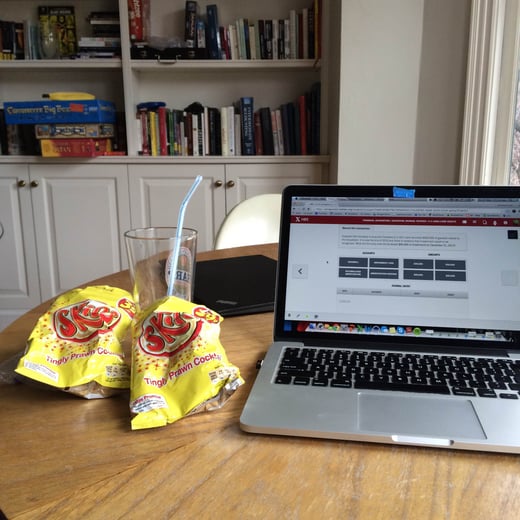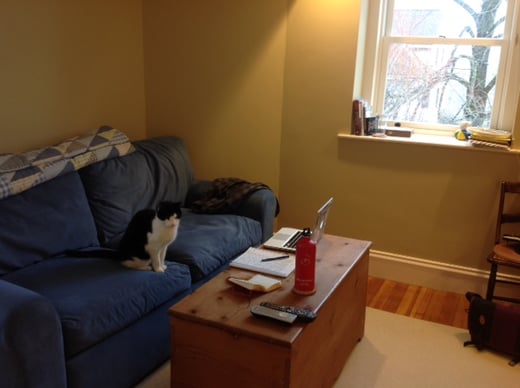This week Conor, Michael, Dan, and Elizabeth share the ways in which they've already applied CORe concepts to their daily lives.
As an ESL teacher, I encounter a wide variety of students and therefore a wide variety of student needs. One area that has often been a challenge to teach is business English.
My students are typically adults who have vast real world experience in business-related fields. They completely understand concepts but lack the language skills to express them in English. It is sometimes difficult because although I can help them with their vocabulary, my limited knowledge on the subject minimizes just how much help I can provide.
Last week, one of my students, an accountant, came to me with questions directly related to her work. I had just finished the second module of the financial accounting course.
I realized mid-lesson that because my understanding of the material has increased, I can better articulate how the material is expressed in the English language to a non-native speaker. I walked out thinking that, had I not just been exposed to and engaged in these ideas, I would not have been as helpful to my student.
Learning these accounting concepts directly relates to my goal of starting my own business one day. This exact scenario was depicted in one of the videos: investing money in a new business, which starts with no assets, no liabilities, and no owners’ equity. That investment raises the company’s assets, as well as its equity, thus signifying the beginning of every company.
Fast forward to our current lesson, financial statements. The Balance Sheet is something my company works with on a daily basis. Currency risk comes to the surface for a breath of fresh air on every international company’s Balance Sheet. In fact, foreign exchange fluctuations can sometimes mean the difference between a company having a profitable and unprofitable quarter. When I was an undergraduate, without the context of real world business examples, I couldn’t see the connection.
When companies transact in multiple currencies, they have risks in translation, transaction, and economic exposure. Previously, I was unable to decipher where companies recorded this exposure on the Balance Sheet.
After progressing through the module, I can now pinpoint where exactly companies show their currency exposure (usually under “other assets” and “other liabilities”). This will help tremendously going forward in quickly being able to comprehend and analyze a company’s foreign exchange picture, and will pay huge dividends in the future of my professional life, and my company.
Last week, I went to IKEA to buy some furniture. As I walked into the parking lot, I saw a huge billboard. The big poster advertised IKEA day-care, for free! I connected the dots between an actual case and the teaching material on "the strategies for assessing and increasing demand" delivered by Prof. Bharat Anand in Economics for Managers. IKEA, the multinational company that sells ready-to-assemble furniture worldwide, acts now as a babysitter! How come?
If you do a conjoint analysis, you would probably find out that there is a substantial customer segment - parents with small children - that values "peace of mind while shopping at IKEA". For parents, having children going around these stores aisles might be dangerous as well as time- and energy-consuming. For young children, shopping with parents can be extremely annoying. Having a place for children just to have fun, and for free, is a perfect fit.
As you deconstruct the willingness to pay for IKEA products, there is this strange attribute, "peace of mind while shopping at IKEA", that appears. Conjoint analysis is an excellent tool to figure this out: by revealing the relative preference for different attributes, business developers at IKEA were able to isolate a relative important underlying request for customers and consequently, to formulate the right response for it: "free day-care."
In this real-life case, "day-care" as a service and "IKEA ready-to-assemble furniture" as products are wonderful complements. "Day-care" helps IKEA core business. I am confident that there are parents that used free childcare at IKEA and became customers. I am also quite sure that parents with "peace of mind while shopping at IKEA" are more willing to spend their money at IKEA.
Great way to increase demand.
A common question that I have been asked about CORe is, “Why are you doing this?”. At first, I gave the initial reasons that I had applied to CORe: it will help me to perform better in my job, it is a good indicator if Business School might make sense, etc.; but what I have come to realise is that CORe offers much more than that.
I have found that the teachings and concepts from CORe are slowly creeping into my daily lexicon and understanding of the world. If you now asked me why I was doing CORe, I would tell you it's because it is so cool to go into a shop or to buy a ticket for a show or to be sitting in a meeting and understand why the object is priced that way or why a company might be running that type of survey or A/B test, etc.
Let me give you an example: The Rockettes. My friends and I have organised a reunion in NYC for the first weekend of May (very excited), and the Rockettes are doing a special short run of their “Spring Spectacular”, clearly a winner.
We clicked right through to the cheapest tickets we could find (Sunday at 5pm in the back of the room), and the ticket price was $50. When we went through to check-out, suddenly the price was lifted to $64.05. We redid the check out process to try and understand why the price had changed and found that there was a $14.05 “processing fee”.
We were angry that Radio City would do this. We talked about how deceptive it was and how unjust, etc., and then we bought the tickets… Radio City could add this processing fee (which is likely pure profit for them) because we were in the elastic part of the demand curve with regards to ticket pricing.
The increase in the price of the tickets, whilst making us angry, did not actually affect whether we bought the tickets or not.
Radio City’s assets would have immediately increased due to our payment at the time of the ticket purchasing. This translates into an increase in owners’ equity for Radio City (Financial Accounting module of CORe). I could go on but I will spare you…
Was I annoyed that Radio City had used their CORe-like knowledge to make more money from me? Sure. However, it was empowering to understand the logic behind what Radio City was doing and the likely steps that it had taken to get there.





























